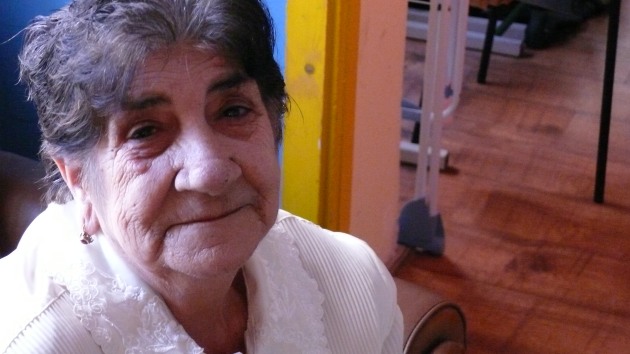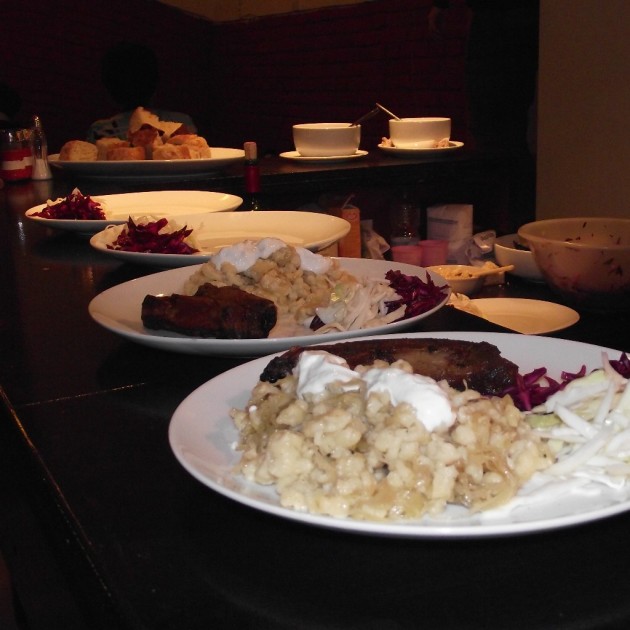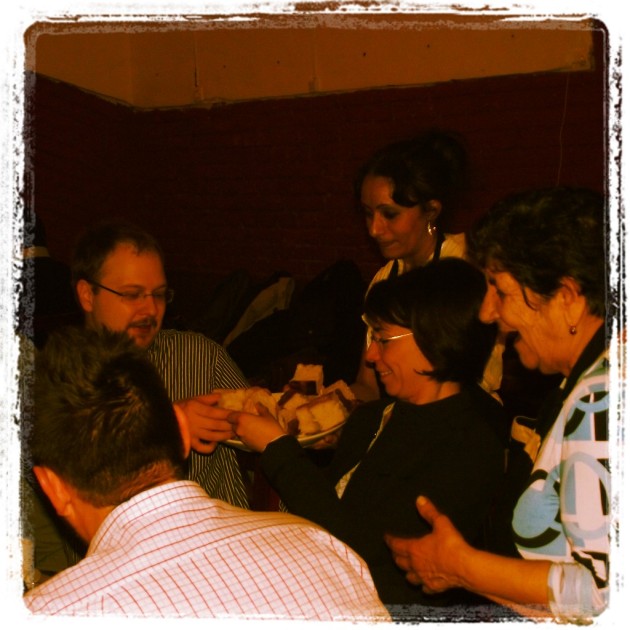Romani Platni (Romanian for Romani Stove) a Roma eatery that fights roma-related stereotypes and misconceptions by bringing Hungarians and Romas closer together in the intimacy of a mutual dinner.
When I first saw Malvin néni (Hungarian for Auntie Malvin as she likes to be called) she reminded me of my late Hungarian grandmother. Just like my grandmother, Malvin néni is energetic and loud, she likes to sing and starts dancing whenever the music is playing and most of all, she loves cooking. But unlike my grandmother, Malvin néni is Roma.
Although Malvin néni never faced any discrimination or atrocities because of her origin, she follows the news of discrimination against Romas in Hungary with concern (Accurate stats are hard to come by but according to a study by the Athena Institute the overwhelming majority of hate crimes in Hungary are committed with racist motivation). So she took it as her mission to ease this racial tension through cooking exquisite and authentic Roma dinners in Romani Platni, Hungary’s first Roma eatery. “My food is not for dieters!” she warns. While eating pork chops, hanuska (potato and dumplings) and the greasy bodagok (roma bread) among many other simple yet delicious Roma dishes, she hopes fear and stereotypes of her Hungarian visitors of the Roma as hostile people will ease too. “They eat a lot of bodagok, they like it a lot,” she says with a proud smile. “When they finish eating I tell them get on you heels, get out of here, time to dance… and they do, they enjoy their time.”
Romani Platni (Romanian for Romani Stove) was opened in February 2012 by a Hungarian social aid group in collaboration with local Roma women and a small grant from the Open Society Institute with the clear aim of bringing Hungarians and Romas closer together in the intimacy of a mutual dinner. The eatery occupies a small room in the aid group’s youth center in Budapest’s infamous 9th district, an area mostly inhibited by residents from minority backgrounds that many Hungarian mothers warn their kids from visiting at night for fear of robbery and violence. Yet, crowds of Hungarians visit the district on a weekly basis to try out the home-made foods of Malvin néni and her 3 other Roma mates. Romani Platni is a not a licensed restaurant that functions 18 hours a day. Rather, it’s a community kitchen where you have to book through email an appointment for a private dinner or subscribe to public dinners . The eatery has no phone number and its street number is not published on the eatery’s blog. According to Kriszta Nagy, the Hungarian Romani Platni project manager, this is done on purpose.
“We don’t have the capacity to manage a professional restaurant but that’s not the point anyway. The idea is for Hungarians to share an intimate and authentic Roma dinner and learn about the ways of the Roma,” Nagy explains. “We want to show them that Romas can do more than just live in poverty. Unfortunately, in the media, Romas are mostly associated with poverty and violence. The women´s attitude at Romani Platni is that I am a Roma and a woman, and I am proud of it.”
Romani Platni solely promotes itself on social media. “The Romani Platni project is aimed at Hungary’s intellectuals circles who live in a totally different world, move between offices and banks and probably never met a Roma. The only way to reach these people is facebook.” Nagy explains. ” and it works! I had to book one month ahead to get a free table.
Hungarians make up 60% of Romani Platni’s guests. The rest are social workers from foreign NGOs and Roma intellectuals who live in mixed families and miss the Roma food. While most visitors are sympethatic to Roma or just curious about the food, Nagy remembers a dinner with an anti-Roma guest. ”He told me he didn’t like Romas, but he came anyway to please his friends,” Nagy recalls. “He sat with a stiff back for the first one hour, then slowly he started to relax and I think by the end he actually enjoyed himself.”
Another source of pride for Nagy is that right wing media appraoched Romani Platni and published what, according to her, might be its first positive coverage of Romas. She also boasts a cooking event Romani Platni organized in collaboration with the Hungarian police to ease the forces’ misconceptions of Romas.
Some Romas like Béla Radics, the director of the Radical Civic Movement for Safeguarding Roma Interests are suspecious about the success of projects like Romani Platni. ”Romani Platni does not have the impact we wish for,” Radics says. “The majority of {Hungarian} society is racist. If they don’t like the Roma people, they won’t like their food.”
Malvin néni agrees that her guests are mostly sympethatic to Romas. “There are racist people, but it’s different here {in the eatery}. I don’t feel that the guests hate us. If they did, they wouldn’t have come to eat,” she says.
Still, Nagy insists that positive inititatives like Romani Platni are important. “Maybe racist people won’t come, but if someone who doesn’t know Romas and sees this aspect of Roma’s first and reads positive articles about them in the right wing media then maybe he/she will start to think differently. This project can’t impact extremists, but it can point those people who don’t have an opinon on this matter in the right direction.”
Check out this story on Storify. I wrote this as part of the World perspectives, minority voices study session organized in Budapest by the Council of Europe, the European Youth Press, Concordia International Group and the Minority Rights Group Europe. Find out more about the study session here and here. Twitter #minorityvoices.


